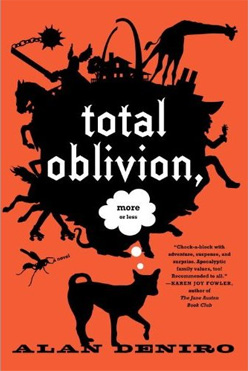“Love What You Will Never Believe Twice”
I’ve been reading Alain Badiou’s Ethics: An Essay on the Understanding of Evil over the weekend. If you have even the slightest tolerance for philosophical wonkiness, I highly recommend it. The book throughout creates touchpoints with questions of what art can mean-or does it mean?-in contemporary society. Badiou is not a postmodernist; in fact he derides postmoderism in favor of truth-processes and universality. (An atheist, he wrote a fascinating little book on St. Paul on this very subject.) Quotes:
“A truth punches a ‘hole’ in knowledges, it is heterogeneous to them, but it is also the sole known source of new knowledges. We shall say that the truth forces knowledges. The verb to force indicates that since the power of a truth is that of a break, it is by violating established and circulating knowledges that a truth returns to the immediacy of the situation, or reworks that sort of portable encyclopedia from which opinions, communications, and sociality draw their meaning.”
“The Good is Good only to the extent that it does not aspire to render the world good. Its sole being lies in the situated advent of a singular truth. So it must be that the power of a truth is also a kind of powerlessness.”
“When all is said and done, consistency is the engagement of one’s singularity…in the continuation of a subject of truth. Or again: it is to submit the perseverance of what is known to a duration peculiar to the not-known. Lacan touched on this point when he proposed his ethical maxim: ‘do not give up on your desire’. For desire is constitutive of the subject of the unconscious; it is thus the not-known par excellence, such that ‘do not give up on your desire’ rightly means ‘do not give up on that part of yourself that you do not know’…’do not give up’ means, in the end: do not give up on your own seizure by a truth-process. But since the truth-process is fidelity, then if ‘Do not give up’ is the maxim of consistency-and thus of the ethics of a truth-we might well say that it is a matter…of being faithful to a fidelity.…It is now an easy matter to spell out the ethic of a truth: ‘Do all that you can to persevere in that which exceeds your perseverance. Persevere in the interruption. Seize in your being that which has seized and broken you.’”
“Every truth…deposes constituted knowledges, and thus opposes opinions. For what we call opinions are representations without truth, the anarchic debris of circulating knowledge. …Opinions without an ounce of truth-or, indeed, of falsehood. Opinion is beneath the true and the false, precisely because its sole office is to be communicable. What arises from a truth-process, by contrast, cannot be communicated. Communication is suited only to opinions (and again, we are unable to manage without them). In all that concerns truths, there must be an encounter….To enter into the composition of a subject of truth can only be something that happens to you. Confirmation of the point is provided by the concrete circumstances in which someone is seized by a fidelity: an amorous encounter, the sudden feeling that this poem was addressed to you, a scientific theory whose initially obscure beauty overwhelms you, or the active intelligence of a political place…As a result, the ethic of a truth is the complete opposite of an ‘ethics of communication.’ It is an ethic of the Real, if it is true that-as Lacan suggests-all access to the Real is of the order of an encounter. And consistency, which is the content of the ethical maxim ‘Keep going!’, keeps going only by following the thread of this Real.
“We might put it like this: ‘Never forget what you have encountered.’ But we can say this only if we understand that not-forgetting is not a memory…In one of my previous books, my formula was: ‘Love what you will never believe twice’. In this the ethic of a truth is absolutely opposed to opinion, and to ethics in general, which is itself nothing but a schema of opinion. For the maxim of opinion is: ‘Love only that which you have always believed.’”





I think there might be a good story hiding in the third quoted paragraph if you start by reading in the SFnal meaning of the word “singularity.”
On a more serious note, the idea that opinions are neither true nor false is one that could stand to gain more currency.